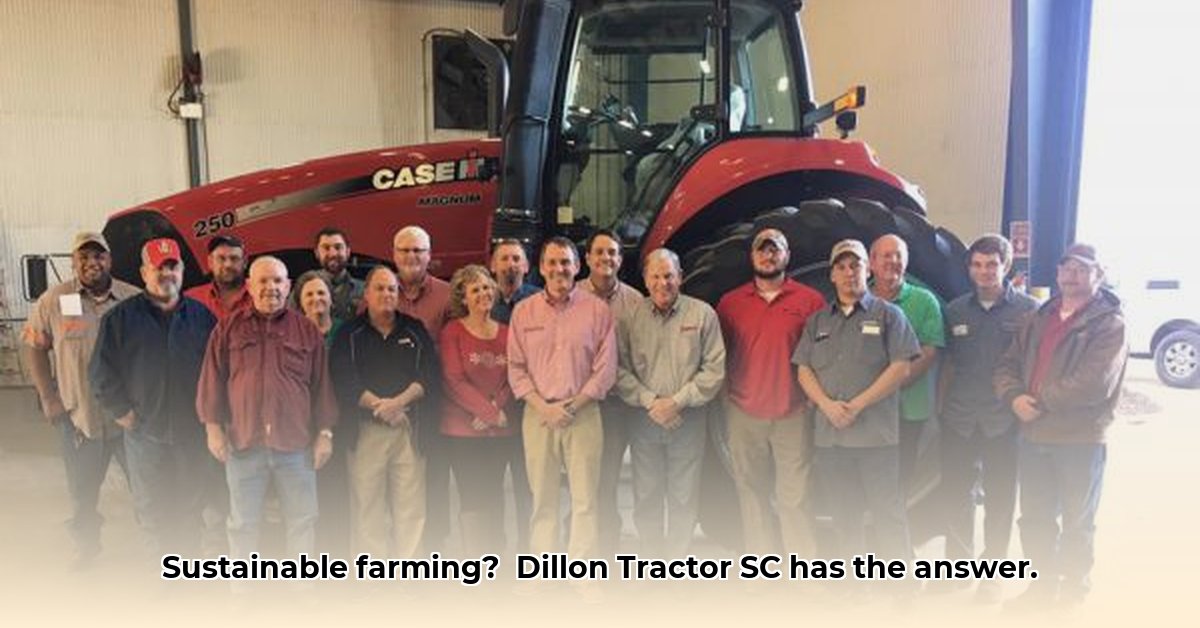
Dillon Tractor & Implement Co. (DT&I) is a respected name in South Carolina and parts of North Carolina, known for providing farmers with quality agricultural equipment. But today's farmers face unprecedented challenges: rising fuel costs, evolving consumer demand for eco-friendly produce, and the imperative to adopt sustainable practices. This article explores how DT&I can not only weather this storm but emerge as a leader in the sustainable agriculture movement in South Carolina. We'll examine DT&I's current position, the opportunities presented by sustainable farming, and actionable strategies for future success. For more information on agricultural equipment, check out this resource.
Adapting to a Changing Landscape: DT&I's Current Position and Future Opportunities
DT&I currently holds a strong position in the South Carolina agricultural equipment market, offering a comprehensive portfolio of new and used equipment. However, the industry is evolving rapidly. The increasing cost of fuel, a growing consumer preference for sustainably produced food, and government incentives for eco-friendly farming practices create both challenges and opportunities for DT&I. How can DT&I leverage these changes to its advantage? The answer lies in embracing sustainable agriculture.
The Sustainability Imperative: South Carolina Farmers and the Future of Farming
South Carolina farmers face increasing pressure to adopt sustainable farming practices. Consumers are demanding more environmentally responsible food production, and government regulations and incentives are pushing in the same direction. The rising cost of fuel further underscores the need for efficiency improvements that sustainable technologies offer. This presents a significant opportunity for DT&I to become a vital partner for farmers seeking to adopt these practices. But how can DT&I capitalize on this opportunity?
Key Takeaway 1: The demand for sustainably produced food is growing, creating a market opportunity for businesses that support sustainable farming practices.
Key Takeaway 2: Government incentives and regulations are driving the adoption of sustainable agricultural techniques in South Carolina.
Key Takeaway 3: South Carolina farmers face increasing financial pressure due to the rising cost of fuel and other inputs.
Actionable Steps for DT&I: Embracing Sustainable Agriculture
To successfully navigate this shifting landscape, DT&I should implement a multi-pronged approach focused on understanding farmer needs, forming strategic partnerships, and actively promoting sustainable farming practices. Here's a roadmap for achieving this:
Step 1: Market Research and Employee Upskilling: Conduct thorough market research to understand the specific needs and challenges of South Carolina farmers transitioning to sustainable practices. This involves direct engagement with farmers, participation in agricultural events, and a close analysis of emerging technologies and trends. Furthermore, invest in training programs to equip DT&I staff with the knowledge and skills to effectively advise customers on sustainable farming techniques and technologies.
Step 2: Strategic Partnerships and Financing Solutions: Forge partnerships with leading providers of sustainable agricultural technologies, including manufacturers of fuel-efficient machinery, precision agriculture tools, and renewable energy systems. Simultaneously, develop customized financing options to make sustainable agricultural equipment more accessible and affordable for farmers. This could involve collaborations with financial institutions to offer attractive loan packages or lease agreements specifically designed for sustainable upgrades.
Step 3: Educational Outreach and Brand Building: Invest in informative workshops, educational outreach programs, and marketing initiatives that clearly communicate DT&I's commitment to sustainable agriculture. Showcase success stories of farmers using sustainable equipment and practices, and position DT&I as a leader and trusted resource in the field. This can involve webinars, farm tours, and collaborations with agricultural organizations.
Step 4: Proactive Risk Mitigation: Address potential risks associated with supply chain disruptions and market competition through strategic planning, diversification of suppliers, and building strong customer relationships. This includes establishing long-term contracts with key suppliers, developing robust contingency plans, and fostering ongoing communication with farmers to understand their needs and address concerns effectively.
"By actively supporting sustainable farming practices, DT&I can position itself as a leader in the industry and ensure its long-term success," says Dr. Emily Carter, Agricultural Economist at Clemson University.
The Future is Sustainable: A Vision for Dillon Tractor SC
By proactively embracing the shift towards sustainable agriculture and implementing the strategies outlined above, DT&I can significantly enhance its market position, strengthen its brand reputation, and contribute to the growth of a vibrant and sustainable agricultural sector in South Carolina. The future of farming is green, and DT&I is well-positioned to lead the way. The key lies in adapting quickly, strategically, and with a deep understanding of the needs of South Carolina’s farmers. This is not solely about environmental responsibility; it’s about strong business acumen in a transforming industry.